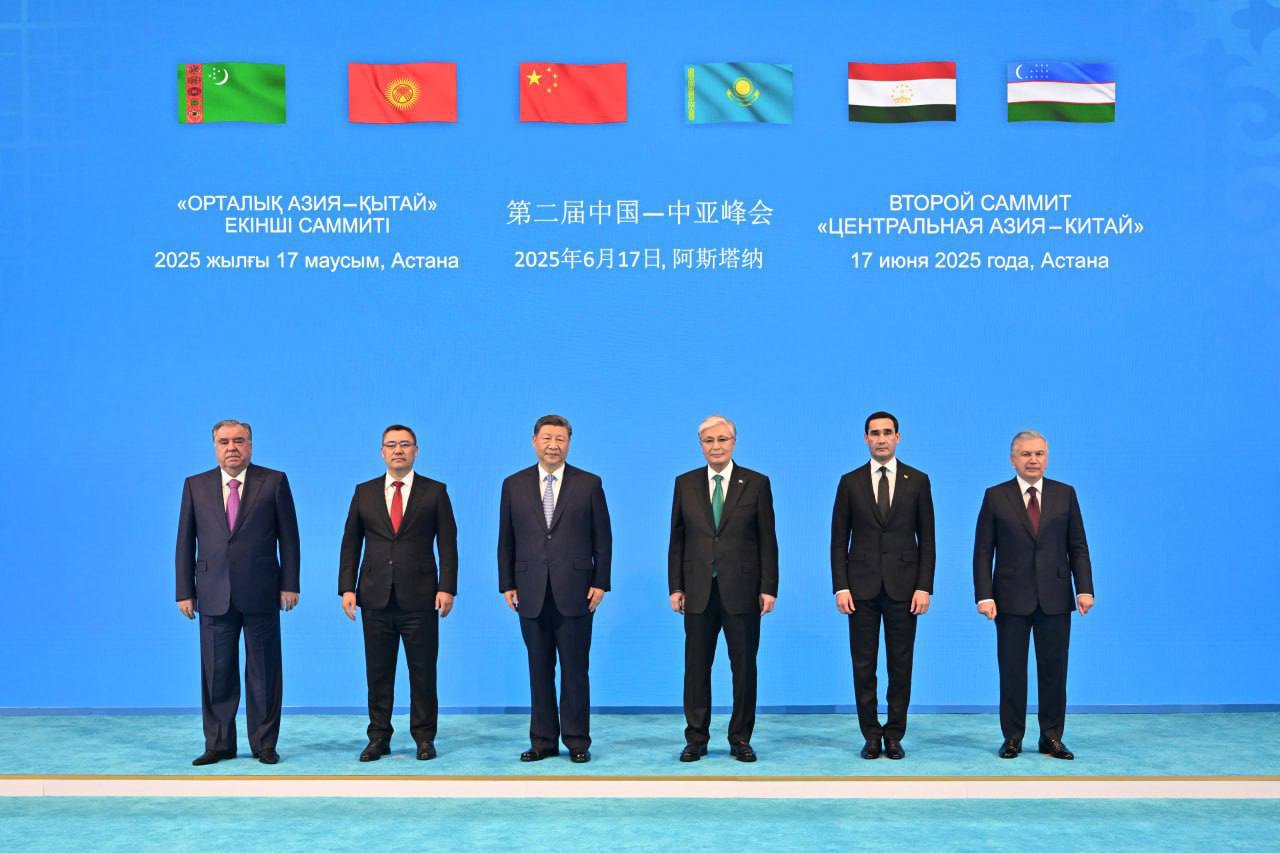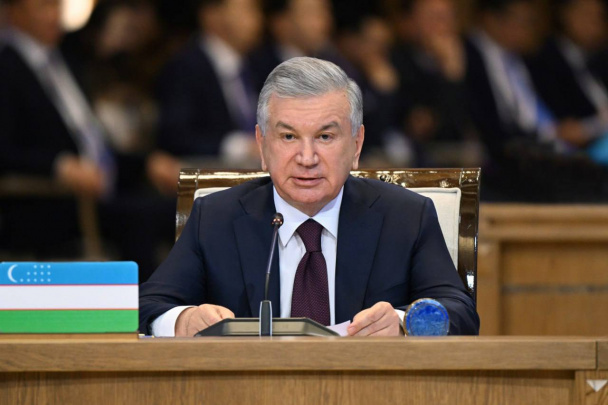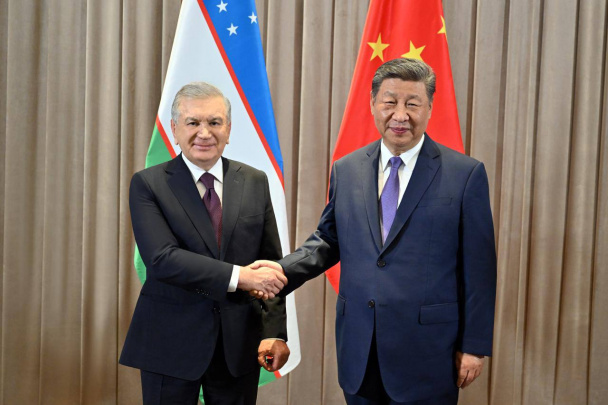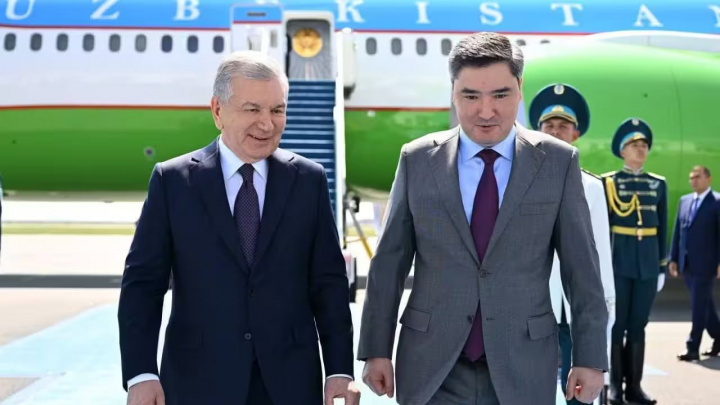Central Asia and China sign landmark treaty on eternal friendship and cooperation
At the conclusion of the second "Central Asia–China" summit held in Astana, the heads of state signed the Astana Declaration and the Treaty of Eternal Good-Neighborliness, Friendship, and Cooperation. Additionally, a substantial package of intergovernmental and interagency documents was adopted.

Photo: Presidential Press Service
On June 17, President Shavkat Mirziyoyev of Uzbekistan took part in the summit in Astana, the capital of Kazakhstan.
The summit was chaired by President Kassym-Jomart Tokayev of Kazakhstan and attended by Chinese President Xi Jinping, Kyrgyz President Sadyr Japarov, Tajik President Emomali Rahmon, and Turkmen President Serdar Berdimuhamedov.
In line with the agenda, the summit participants discussed prospects for expanding mutually beneficial cooperation between China and the Central Asian countries in key priority areas, along with urgent international and regional issues.
In his opening remarks, President Mirziyoyev emphasized the key role of President Xi Jinping in strengthening friendship and cooperation with Central Asian states and in supporting the region’s sustainable development through the implementation of concrete projects and programs.
“We believe that on one hand, the deep transformation processes taking place within Central Asia – a region now characterized by trust, good neighborliness, and partnership – and on the other, China’s consistent commitment to fostering friendly relations with its neighbors and promoting the Belt and Road Initiative are enabling this format of cooperation to thrive,” the Uzbek leader said.
President Mirziyoyev then shared his vision for further developing regional cooperation.
“The use of force to resolve international disputes and conflicts is unjustifiable and unacceptable,” he stated. “All disagreements must be resolved solely through diplomatic efforts – at the negotiating table – based on respect for sovereignty, international law, and the UN Charter.”
The president underscored that trade, investment, and technological cooperation with China serves as a powerful driver for the implementation of socio-economic development strategies in all Central Asian countries.
He proposed the prompt adoption of a new economic partnership program and the establishment of an Interregional Council on Trade and Investment at the level of deputy prime ministers. Uzbekistan expressed readiness to host the first meeting of the council by the end of this year.
To promote trade, President Mirziyoyev proposed launching a “Digital Silk Road” multilateral trade platform within the framework of the “Digital Space and Route” initiative.
He also highlighted the need to harmonize regulations and standards and called for the creation of a regional center for industrial standardization and certification in Tashkent to certify export goods in accordance with Chinese requirements.
The Uzbek leader stressed the importance of introducing effective financial instruments to support large-scale regional projects.
“Today’s international mechanisms undoubtedly play an important role, but they do not fully meet the region’s investment needs. According to expert estimates, the infrastructure investment gap in Central Asia is projected to reach several hundred billion dollars,” he noted.
In this context, he proposed considering the establishment of a “Central Asia–China” Development Fund as a practical platform to advance infrastructure initiatives.
Enhancing transport connectivity between Central Asia and China was named another key priority.
The ongoing construction of the “China–Kyrgyzstan–Uzbekistan” railway was highlighted as a vital component of the emerging transport and transit network across Eurasia. At the same time, the implementation of the Trans-Afghan Railway project could open even broader opportunities.
“We should instruct our transport agencies to conduct field studies, explore logistics infrastructure modernization, and implement pilot projects for cargo transportation via alternative corridors. For this, we need to form expert groups,” the president suggested.
Addressing the threats posed by climate change to sustainable development, the president proposed accelerating the adoption of the “Green” Development Program until 2030. He also called for the creation of an Environmental Alliance to foster dialogue and cooperation on combating desertification, restoring degraded lands, and enhancing bio-ecological sustainability in arid and desert regions.
“I would also like to highlight opportunities for cooperation in artificial intelligence and digital technologies. These are key drivers of long-term growth and competitiveness in our national economies today,” the president stated.
To create a resilient digital infrastructure for economic cooperation, he proposed establishing integrated data processing centers and banking networks, along with laying a digital corridor for the Central Asia–China fiber-optic communication line across major energy and transport routes.
“Our peoples' shared aspiration to enrich and bring closer their cultures is our invaluable treasure. The newly adopted initiative on easing mutual visits and the cultural-humanitarian program aim precisely at fostering these ties,” the president said.
To strengthen this cooperation further, he proposed creating a unified digital portal titled “Silk Road Cultural Heritage,” which would integrate the historical and cultural assets of Central Asia and China and be accessible to researchers, students, tourists, and representatives of the creative industries.
He also emphasized the importance of developing a joint scientific and educational platform through a vocational education cooperation program, forums of university rectors, and meetings of academy heads and research centers.
Security cooperation remains one of the top priorities. In this regard, the president highlighted the importance of establishing multilateral information-sharing mechanisms among intelligence services and security councils to counter terrorism, extremism, radicalism, drug trafficking, illegal migration, and cybercrime.
“We are deeply concerned about the declining attention of the international community to the problems of Afghanistan, which is not only our neighbor but an integral part of our shared historical, cultural, and economic space,” the Uzbek president stated.
Referring to the accumulated experience of cooperation between China and Central Asian states with Afghanistan, he proposed the creation of a high-level group to assist in the country's reconstruction and integration into regional processes. Uzbekistan expressed readiness to host this meeting in the city of Termez with the participation of Afghan representatives.
In conclusion, President Mirziyoyev reaffirmed Uzbekistan’s support for open dialogue and pragmatic, mutually beneficial cooperation within the “Central Asia–China” framework.
At the end of the summit, the heads of state signed the Astana Declaration and the Treaty of Eternal Good-Neighborliness, Friendship, and Cooperation.
A substantial package of intergovernmental and interagency documents was also adopted.
The summit concluded with the launch of platforms for cooperation in poverty reduction, combating desertification, education, and barrier-free trade.
Related News

15:56
China to fund public welfare projects in Central Asia with $209M grant

20:06 / 17.06.2025
Uzbekistan supports China–Central Asia connectivity with new energy and tech initiatives

15:27 / 17.06.2025
Uzbekistan and China agree to expand strategic cooperation

11:59 / 17.06.2025



